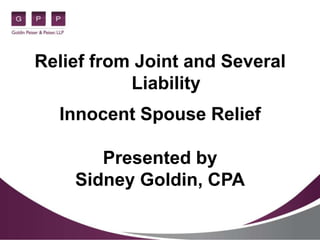
Relief from Joint & Several Liability: Innocent Spouse Relief
- 1. Relief from Joint and Several Liability Innocent Spouse Relief Presented by Sidney Goldin, CPA
- 2. History A. Pre-1998 Act Law Requirements 1. Understatement of Tax Liability a.)Applied only if understatement exceeded a certain percentage of innocent spouse income 2. No specific provision or guidelines for equitable treatment for innocent spouses for underpayments of tax liability
- 3. IRS Restructuring and Reform Act of 1998 A. Expansion of Spousal Relief B. Liberalization of Requirements C. Filed on Form 8857
- 4. IRS Restructuring and Reform Act of 1998 D. Code Section 6015(b) 1. Understatements of Tax Liability a.) Amended Tax Returns b.) Deficiencies (below) 2. No relief if innocent spouse knew or should have known of understatement 3. No relief if requesting spouse received significant benefit
- 5. IRS Restructuring and Reform Act of 1998 E. Code Section 6015(c) 1. Election to Allocate as Separate Liability a.) Tax Return Filing b.) Audits with resulting deficiencies c.) Liability allocated in proportion to items attributable to deficiency of particular spouse
- 6. IRS Restructuring and Reform Act of 1998 F. Equitable Relief for Understatements and Underpayments (code Section 6015(f)) 1. Cannot qualify under 6015(b) or 6015(c) 2. Form 8857 must be filed 3. All relevant factors considered
- 7. IRS Restructuring and Reform Act of 1998 G. Revenue Procedure 2003 – 61, Section 4.02 – Safe Harbor Provisions 1. Requesting spouse no longer married at time of filing for relief; joint return filed during marriage 2. Requesting spouse must have had reasonable belief that tax liability would be paid 3. Requesting spouse would suffer economic hardship if not granted relief Service will ordinarily grant relief if all provisions are satisfied
- 8. IRS Restructuring and Reform Act of 1998 H. General Prerequisites to Equitable Relief (Rev. Proc. 2003-61, Section 4.01, 2003-2, CB 296) 1. Joint return filed 2. No relief available under 6015(b) or (c) 3. No transfer of assets between spouses in fraudulent scheme
- 9. IRS Restructuring and Reform Act of 1998 4. No transfer of disqualified assets among spouses (tax avoidance) 5. No failure to file or fraudulent filing by requesting spouse 6. Underpayment of liability is attributable to non-requesting spouse
- 10. IRS Restructuring and Reform Act of 1998 I. Revenue Procedure 2003-61, Section 4.03(2), 2003-2, CB 296 1. Referred to as eight “balancing factors” considered by Tax Court Cases, Thomassen and Gail Prescott Drayer a.) No longer married b.) Knowledge c.) Economic Hardship
- 11. IRS Restructuring and Reform Act of 1998 d) Significant Benefit e) Compliance with Federal Income Tax Laws f) Abuse g) Mental or Physical Health h) Non-requesting Spouse’s legal obligation to pay the taxes pursuant to divorce decree
- 12. Wife Granted Full Relief No Payments Joint Husband Wife Liability $100,000 Split Liability $100,000 $100,000 Transferred <$100,000> Relief $0 <$100,000> Due $0 Due $100,000 $0 $50,000 Paid In Joint Husband Wife Liability $100,000 Split Liability $50,000 $50,000 Paid In <$50,000> Relief $0 $50,000 Transferred <$50,000> Due $50,000 $0 Due $0
- 13. IRS Restructuring and Reform Act of 1998 J. Non-requesting spouse must be notified of filing by requesting spouse from the IRS 1. Must be given opportunity to contest 2. Must be allowed to participate in all proceedings
- 14. IRS Restructuring and Reform Act of 1998 K. “Injured” Spouse Relief 1. Not the same as innocent spouse claim 2. Joint return filed and refund used to pay past taxes of liable spouse 3. Non-liable spouse qualifies for refund 4. Filed on Form 8379
- 15. IRS Restructuring and Reform Act of 1998 L. Code Section 6015(e) 1. Denial of relief by IRS reviewable by U.S. Tax Court 2. Case heard on a “De Novo” or fresh basis (non abuse standard) 3. No IRS collection or enforcement action during pendency of all legal proceedings
- 16. For Additional Information Contact Sidney Goldin, CPA Goldin Peiser & Peiser, LLP Sgoldin@GPPcpa.com 214-635-2509 www.GPPcpa.com Note: This content is accurate as of the date published above and is subject to change. Please seek professional advice before acting on any matter contained in this presentation.
